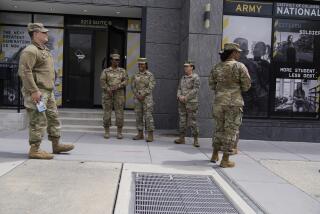Big Bonus for Re-Upping With Uncle Sam
- Share via
WASHINGTON — Stretched thin and eager to keep soldiers in Iraq and Afghanistan, the Army started 2004 with a new policy: $5,000 to $10,000 bonuses for soldiers in the two war zones who sign up for three more years.
The carrot comes with a stick. Having authorized unit recruiters to start handing out the bonuses when the new year began Thursday, Army officials said Monday they were extending a policy prohibiting soldiers from leaving the service, even if their contractual obligation was over, as long as their units were in a war zone. About 7,000 soldiers are affected.
The two-pronged approach marks the latest effort to ensure adequate personnel for the wars in Iraq and Afghanistan since the Sept. 11 terror attacks dramatically expanded the commitment of U.S. forces across the globe. Although senior civilians in the Pentagon discussed shrinking the Army’s 10 divisions shortly before the attacks, many policymakers on Capitol Hill, in the Army and elsewhere have argued recently that the war on terrorism is likely to leave the service overburdened for years and in need of expansion.
“It’s kind of self-evident that the Army’s really stretched. The question for policymakers has to be: Is this just a temporary spike or is this something longer-term? My own view is this is longer-term, and part of what’s needed is an expansion of the Army,” said Eliot Cohen, a military analyst at the Johns Hopkins School of Advanced International Studies in Washington.
Until the Afghan war began in 2001, the prohibition on leaving the service, known as a “stop-loss” order, had not been used since the 1991 Persian Gulf War, when nearly all soldiers were affected.
Under the policy announced Monday, if a soldier with two months remaining in his enlistment is in a unit being sent to a war zone, he will not be able to leave the service until 90 days after his unit returns home. This will effectively extend a soldier’s enlistment by almost a year, since units are now scheduled to spend 12 months in war zones.
The most recent stop-loss order, issued Nov. 13, affected more than 110,000 active-duty soldiers scheduled to leave for Iraq and Afghanistan by May. Because that order takes effect 90 days before the troops’ 12-month deployments and lasts for 90 days after a return home, those soldiers could not leave the Army before spring 2005, even if their enlistments expired.
In the program outlined Monday, the Army has budgeted $63 million for bonuses in 2004, enough to pay 6,300 to 12,600 soldiers who agree to spend a few more years in the service. The amount of the bonus is based on a soldier’s rank. For those who collect their money before returning home, the bonus -- like their paychecks -- is tax-free.
The stop-loss order was designed to keep units intact and avert “turbulence in the force,” said Col. Elton Manske, the Army’s deputy chief of staff for enlistment, who outlined the new policy to reporters. No Army unit to date has been depleted by more than about 6%, he said.
“Our sense from commanders and senior career counselors in and out of theater is that soldiers are ready, willing and able to enlist,” Manske said. Nevertheless, he acknowledged, “I believe you’re all aware there are some stresses on the system.”
The 101st Airborne Division, based at Ft. Campbell, Ky., will be among the first combat units to return from Iraq, followed later this year by the 1st Armored Division, the 4th Infantry Division, the 173rd Airborne Brigade, the 2nd Light Cavalry Regiment, the 3rd Armored Cavalry Regiment and parts of the 82nd Airborne Division.
More to Read
Sign up for Essential California
The most important California stories and recommendations in your inbox every morning.
You may occasionally receive promotional content from the Los Angeles Times.













